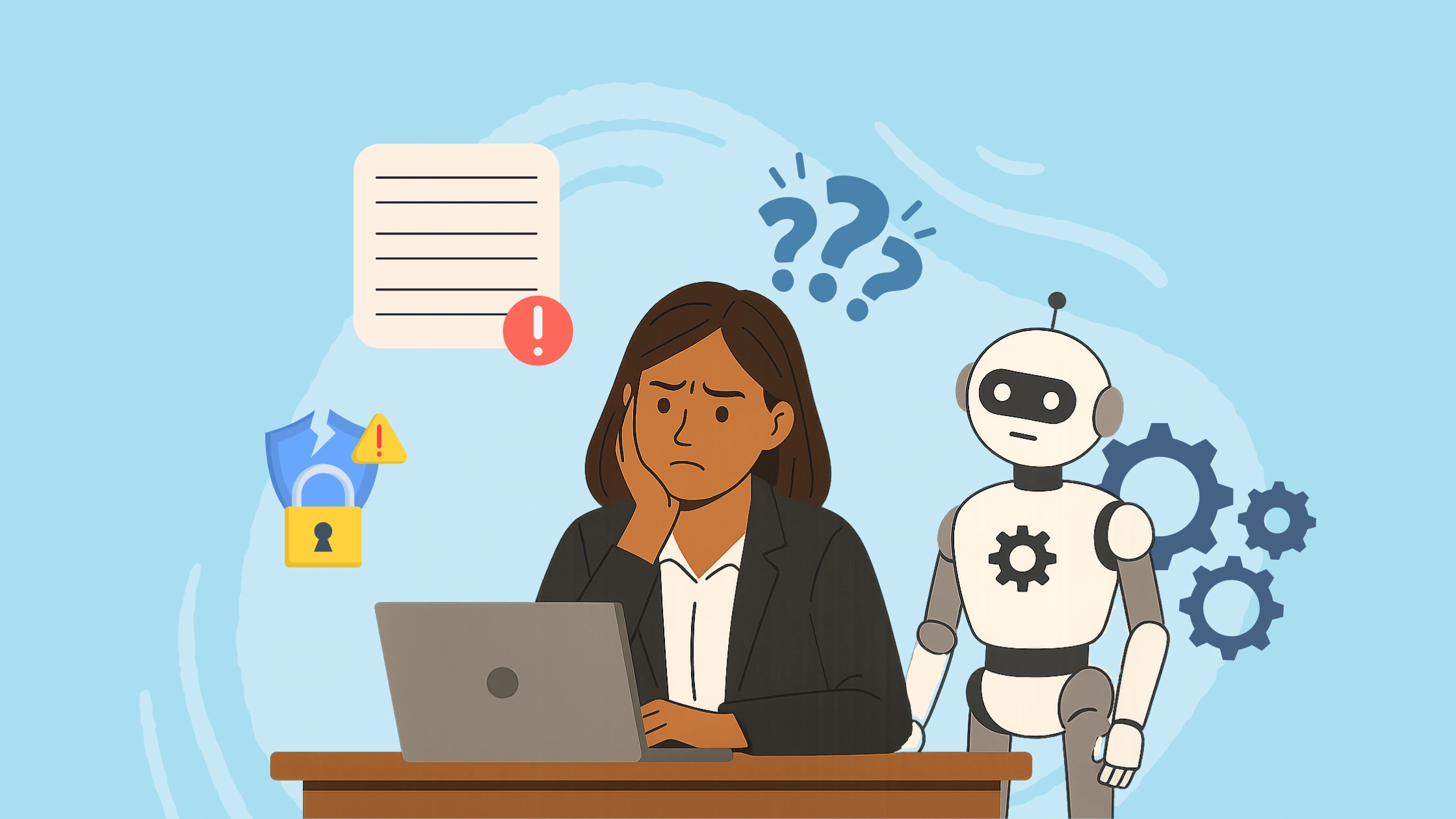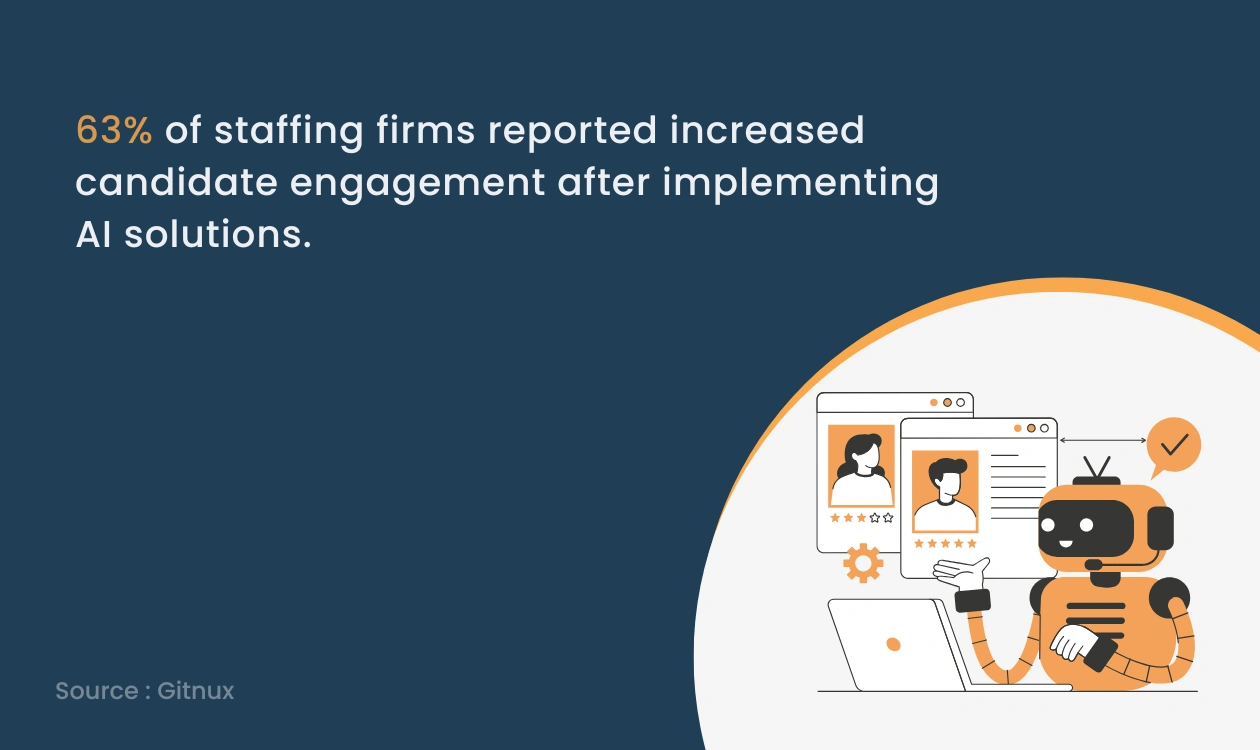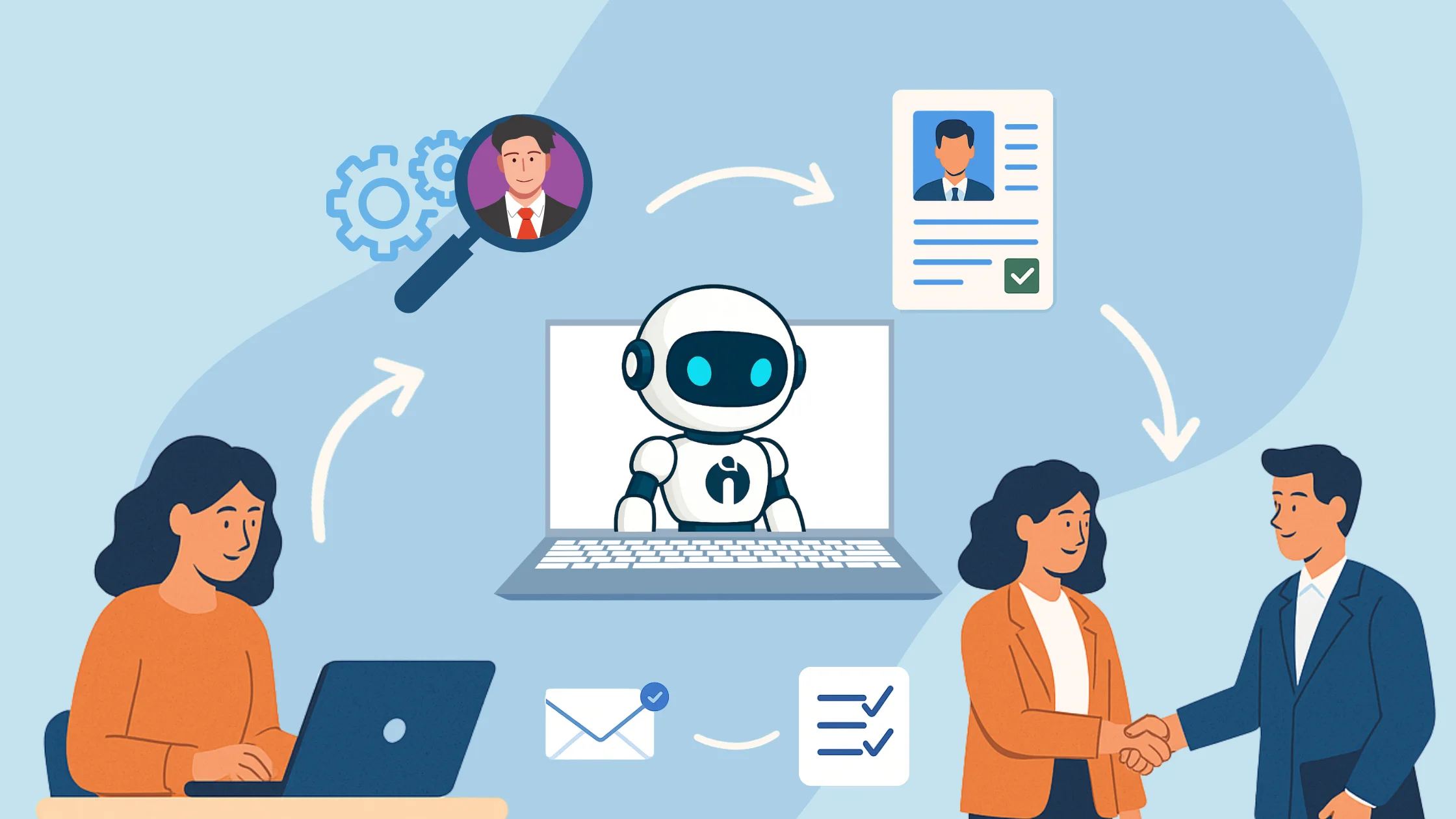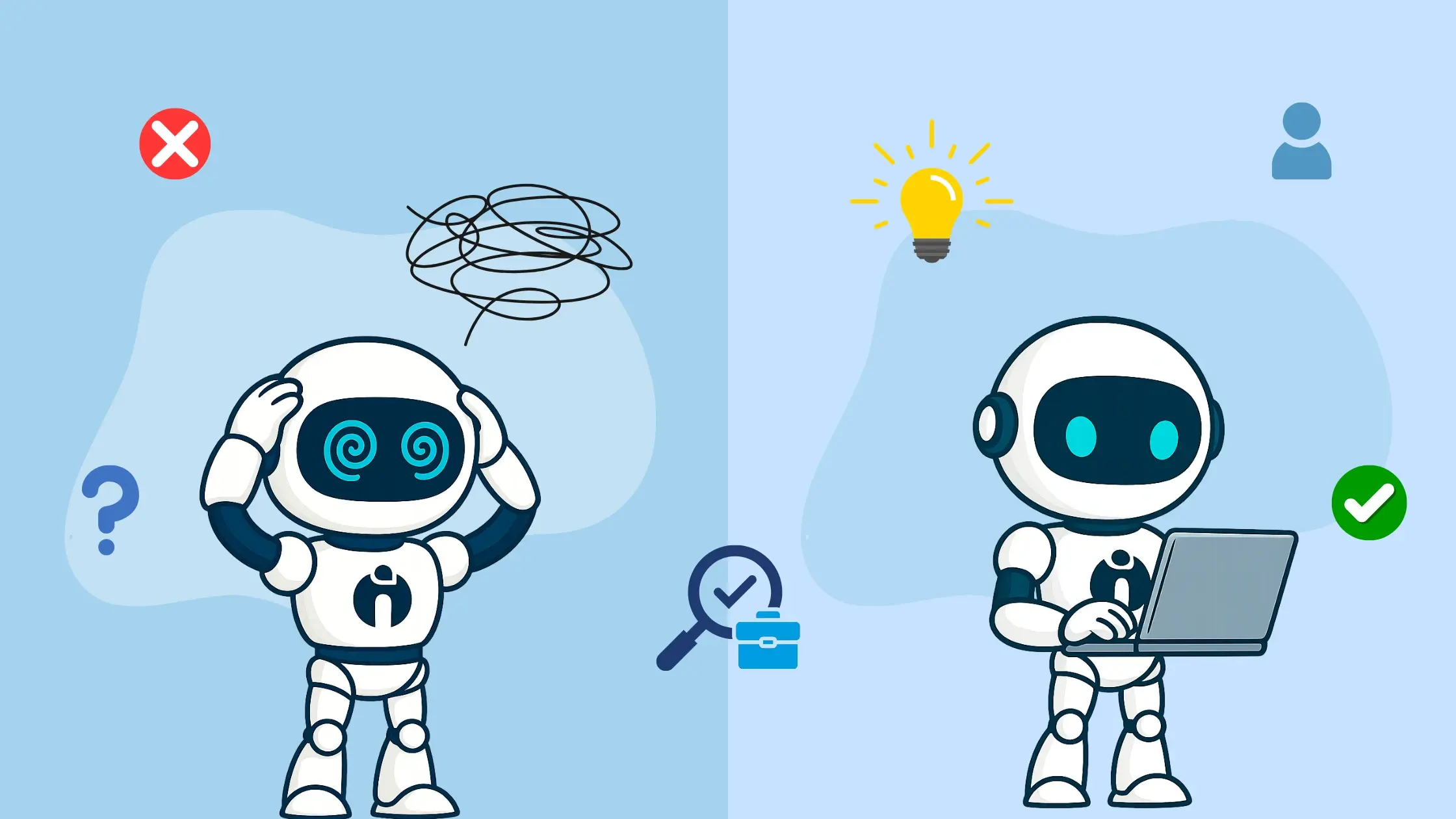TL;DR
- AI recruitment agents streamline hiring by automating repetitive tasks and enhancing candidate experience.
- Key challenges include resistance to change, data privacy, algorithmic bias, integration issues, skill gaps, ethical concerns, balancing automation with human interaction, and high implementation costs.
- Addressing these involves training, transparent AI use, secure data handling, seamless system integration, and maintaining human oversight.
- Proper adoption leads to improved efficiency, fairness, better candidate engagement, and stronger talent acquisition strategies.
Artificial intelligence (AI) is transforming recruitment, helping organisations hire smarter and faster. From automating repetitive administrative tasks to providing deeper insights into candidate profiles, AI recruitment agents are particularly valuable for staffing agencies, where managing large volumes of candidates efficiently is crucial. By taking over routine processes, AI reduces the workload on HR teams and enhances the overall candidate experience.
Yet, adopting AI in recruitment comes with challenges. Organisations often face resistance to change, data privacy concerns, potential algorithmic bias, integration issues, and the cost of new technology. Ensuring recruiters have the right skills to use AI effectively is also a key hurdle.
This blog explores the challenges in adopting AI recruitment agents and offers practical solutions. By understanding how AI can support recruiters rather than replace them, staffing agencies can focus on meaningful human interactions while AI handles repetitive tasks, improving both efficiency and hiring outcomes.
What Are the Key Challenges in Adopting AI Recruitment Agents?
Before diving into solutions, it’s important to understand the key obstacles organisations face when implementing AI in recruitment. Each challenge affects the recruitment process differently, and recognising them is the first step to turning potential barriers into opportunities. According to Gitnux, 63% of staffing firms reported increased candidate engagement after implementing AI solutions.
1. Resistance to Change and Organisational Culture
Introducing AI into recruitment often meets resistance. Recruiters may fear that the technology will replace them, while managers may hesitate to invest time and resources into adoption. In some organisations, long-standing processes and traditional hiring methods create a natural inertia against new tools. This resistance can manifest as low engagement, reluctance to try new features, or outright scepticism about the value of AI.
Impact if ignored:
- Delayed implementation and reduced efficiency.
- Missed opportunities to improve candidate experience.
- Frustration among HR teams trying to balance manual processes with AI trials.
Strategies to Overcome Resistance:
It is important to understand that AI adoption is changing recruiters’ roles rather than replacing them. Start by implementing AI in small, manageable ways, like automating candidate screening or scheduling interviews. Hold interactive workshops and open discussions to address concerns and demonstrate real-life examples of AI reducing administrative workload. Providing hands-on training helps recruiters feel confident using AI and understand how it frees them to focus on meaningful interactions.
Benefits of AI:
- Reduces repetitive tasks.
- Allows recruiters to spend more time on strategy and relationship-building.
2. Data Privacy and Compliance Concerns
AI recruitment agents handle large volumes of candidate data, from personal information to employment history. With GDPR and other privacy laws, organisations must ensure data is collected, stored, and processed securely. Missteps can erode trust and even result in legal penalties. Candidates may also be wary of sharing sensitive information if they feel the system is not secure.
Impact if ignored:
- Candidates may disengage, reducing the talent pool.
- Legal risks and potential fines.
- Damage to the employer brand and candidate trust.
Addressing Data Privacy Concerns:
Select AI recruitment tools that prioritise privacy by design. Features such as encrypted storage, secure access controls, and anonymised data help safeguard sensitive information. Transparency is key to communicating to candidates how their data is used and giving them control over it. By integrating privacy into daily recruitment processes, organisations can turn compliance into a competitive advantage while keeping candidates confident in the process.
Benefits of AI:
- Automates secure data handling, reducing human error.
- Enhances trust without slowing down recruitment.
3. Algorithmic Bias and Fairness
AI is only as unbiased as the data it’s trained on. If historical recruitment data contains biases, AI may inadvertently replicate them. This could lead to unfair outcomes related to gender, ethnicity, age, or educational background. Bias in hiring doesn’t just impact diversity; it can hurt an organisation’s reputation and even result in legal challenges.
Impact if ignored:
- Inequitable hiring decisions.
- Reduced diversity and inclusion.
- Damage to the employer brand and potential legal consequences.
Ensuring Fairness and Reducing Bias:
Choose AI recruitment agents that use explainable algorithms and diverse datasets. Conduct regular audits to detect and correct bias. Ensure human oversight is involved in reviewing AI recommendations. Over time, AI can help standardise candidate evaluation, creating a fairer and more objective recruitment process.
Benefits of AI:
- Provides insights that reduce human bias.
- Supports diversity initiatives and equitable hiring practices.
4. Integration with Existing Recruitment Technology
Many organisations rely on older HR systems, which can make integrating AI difficult. Data silos, incompatible platforms, and fragmented workflows can slow adoption and reduce overall efficiency. Recruiters may need to manually transfer information between systems, wasting time and creating room for errors.
Impact if ignored:
- Missed insights due to disconnected systems.
- Increased administrative burden.
- Difficulty tracking candidates across platforms.
Overcoming Integration Challenges:
Opt for AI recruitment software designed for seamless integration. Modular, cloud-based tools can connect with Applicant Tracking Systems (ATS) and other HR platforms. Real-time syncing ensures recruiters have accurate, up-to-date information. By unifying data, organisations improve efficiency and enable smarter decision-making.
Benefits of AI:
- Streamlines workflows.
- Reduces manual errors and improves candidate tracking.
5. Skill Gaps and Training Needs
Even the best AI system won’t deliver results if recruiters don’t know how to use it. Lack of technical knowledge or confidence can make adoption slow and frustrating. Teams may underutilise features or avoid AI entirely.
Impact if ignored:
- Inefficient use of AI tools.
- Frustration and disengagement among HR teams.
- Reduced ROI on AI investment.
Bridging Skill Gaps:
Providing structured training and introducing practical AI agent use cases such as automated resume parsing, candidate shortlisting, and interview scheduling can help recruiters adopt these tools effectively. This approach empowers HR teams to focus on strategic recruitment while AI takes care of time-consuming, manual processes.
Benefits of AI:
- Automates repetitive tasks, replacing manual hiring tasks.
- Improves accuracy and efficiency in candidate evaluation.
6. Ethical Implications and Accountability
AI decisions can seem opaque, and HR teams may worry about accountability. Without transparency, organisations may face criticism if AI recommendations are questioned. Ensuring ethical use of AI is essential to maintaining fairness and compliance.
Impact if ignored:
- Reduced trust in AI among recruiters and candidates.
- Difficulty defending hiring decisions.
- Ethical and legal risks.
Promoting Ethical AI Use:
Choose AI recruitment agents with clear audit trails and explainable insights. HR managers can review AI suggestions and intervene when necessary. Combining human oversight with AI recommendations ensures accountability while benefiting from automation.
Benefits of AI:
- Supports transparent decision-making.
- Reduces human error and ensures consistent practices.
7. Balancing Automation with Human Touch
While automation improves efficiency, over-reliance on AI can make the recruitment process feel impersonal. Candidates value human interaction, personalised communication, and thoughtful feedback elements that AI alone cannot fully replicate. For staffing agencies, this balance is particularly important, as their reputation often depends on maintaining strong relationships with both clients and candidates.
Impact if ignored:
- Candidate disengagement.
- Negative perceptions of the employer brand.
- Risk of losing top talent.
Maintaining Human Engagement:
Staffing agencies can leverage AI to handle repetitive and administrative tasks, freeing recruiters to maintain personal engagement with candidates. A hybrid approach ensures speed and efficiency without sacrificing the human touch.
Benefits of AI:
- Streamlines repetitive tasks.
- Enhances candidate experience without losing the human element.
8. High Implementation Costs
Investing in AI recruitment software like iSmartRecruit can require a significant upfront outlay. Costs may include software licences, integration with existing systems, training, and even consultancy fees. For some organisations, especially smaller staffing agencies, these initial expenses can seem daunting.
Impact if ignored:
- Delays in AI adoption.
- Limited access to advanced features due to budget constraints.
- Pressure on HR teams to show quick ROI.
Managing Costs Effectively:
Start with high-impact modules, such as resume parsing or candidate matching. Gradually expand to other areas as benefits become clear. Conduct a cost-benefit analysis to demonstrate savings in time, improved hires, and lower turnover. Scalable, cloud-based solutions make it easier to grow AI capabilities over time.
Benefits of AI:
- Strategic long-term investment.
- Measurable improvements in efficiency, quality of hire, and recruitment ROI.
Conclusion
The challenges in adopting AI recruitment agents are real but manageable. From cultural resistance and skill gaps to data privacy, bias, and cost concerns, each obstacle has practical solutions. By thoughtfully integrating AI with human expertise, organisations can improve efficiency, fairness, and the candidate experience, creating a recruitment process that is both faster and more accurate.
Platforms like iSmartRecruit demonstrate how modern AI recruitment agents can seamlessly support HR teams. With features designed to address data privacy, integration, and candidate engagement, such solutions enable recruiters to focus on meaningful interactions while AI handles time-consuming tasks.
When implemented carefully, AI becomes a strategic partner, helping organisations work smarter, make better hiring decisions, and strengthen their talent acquisition strategies. The result is not just faster hiring, but higher-quality candidates and an employer brand that stands out in a competitive job market.
Frequently Asked Questions (FAQs)
1. What are the main challenges in adopting AI recruitment agents?
Key challenges include resistance to change, data privacy concerns, algorithmic bias, integration with existing systems, and skill gaps among HR professionals.
2. How can organisations overcome these challenges?
Organisations can overcome these challenges by providing comprehensive training, ensuring transparency in AI decision-making processes, regularly auditing AI systems to detect and mitigate biases, integrating AI tools with existing HR systems, and fostering a culture of adaptability and innovation.
3. Can AI recruitment agents coexist with traditional HR processes?
Yes. Modern AI tools are designed to integrate with existing HR systems, complementing rather than replacing traditional processes, and improving overall workflow efficiency.
4. How can recruiters be trained to use AI effectively?
Recruiters benefit from structured training, hands-on practice, and exposure to AI agent use cases such as automated resume parsing, candidate shortlisting, and interview scheduling to enable smooth adoption.
5. How does AI change the role of recruiters?
AI shifts recruiters’ focus from repetitive administrative work to strategic responsibilities, allowing them to engage more with candidates, build relationships, and make informed hiring decisions.















